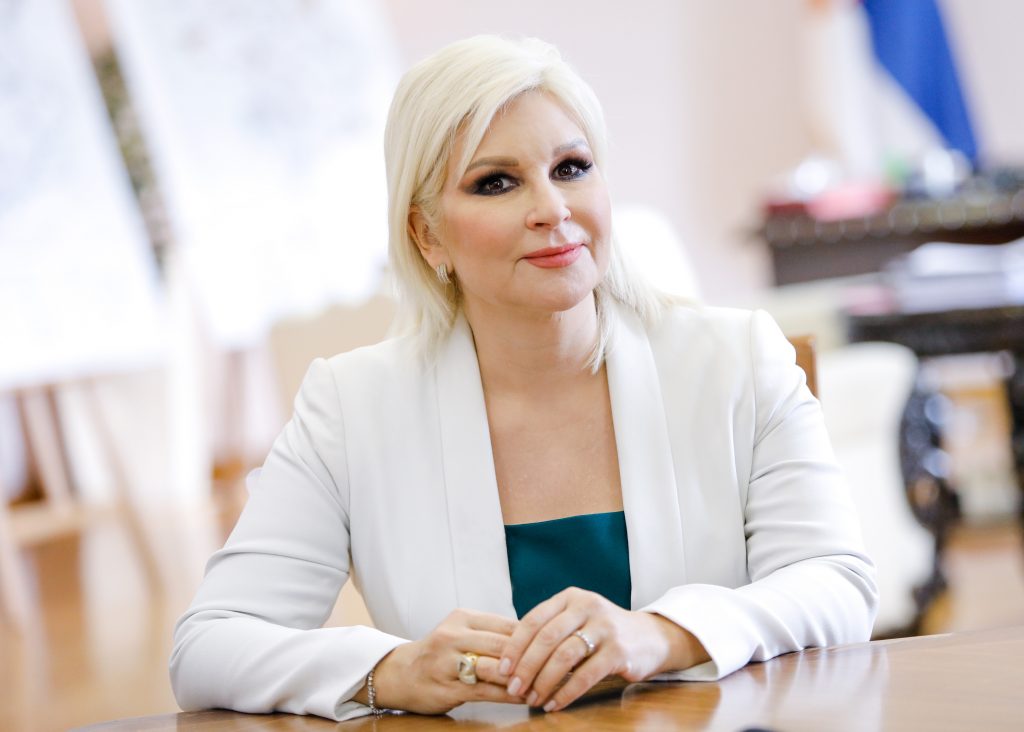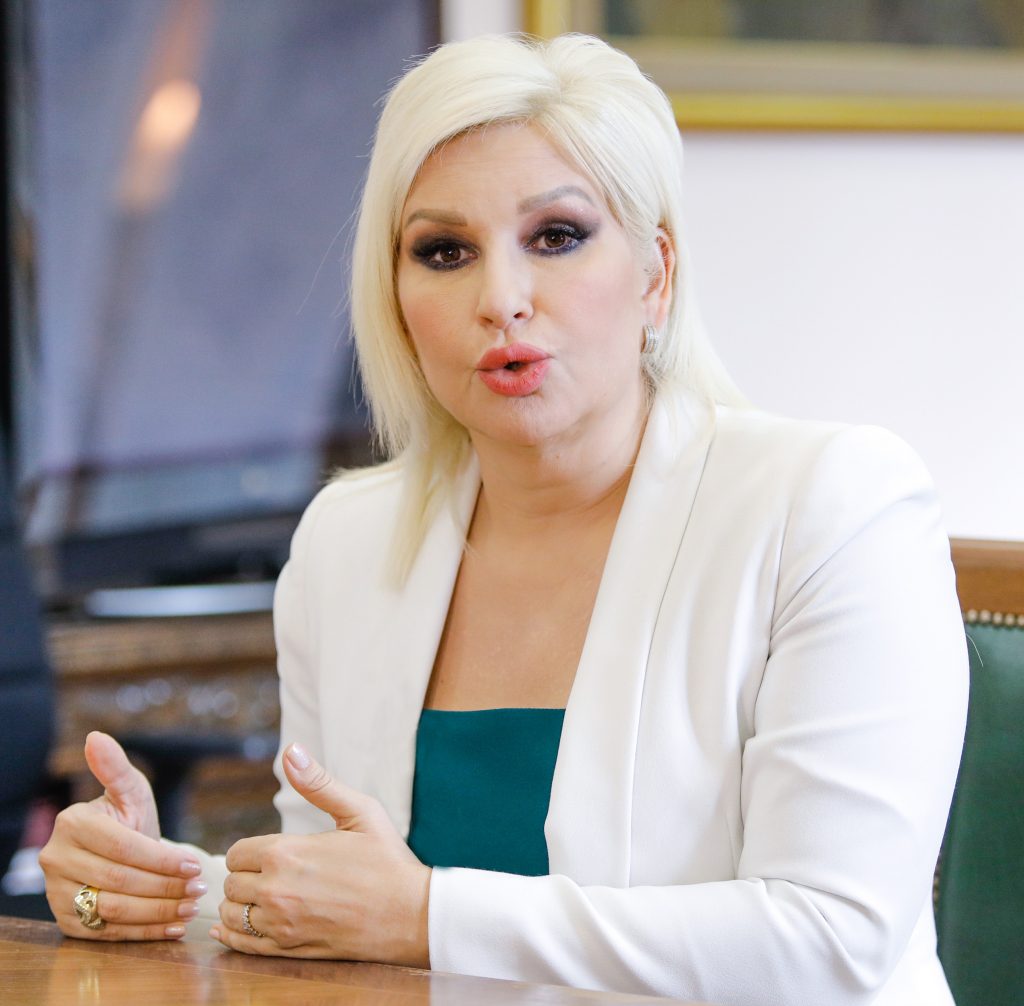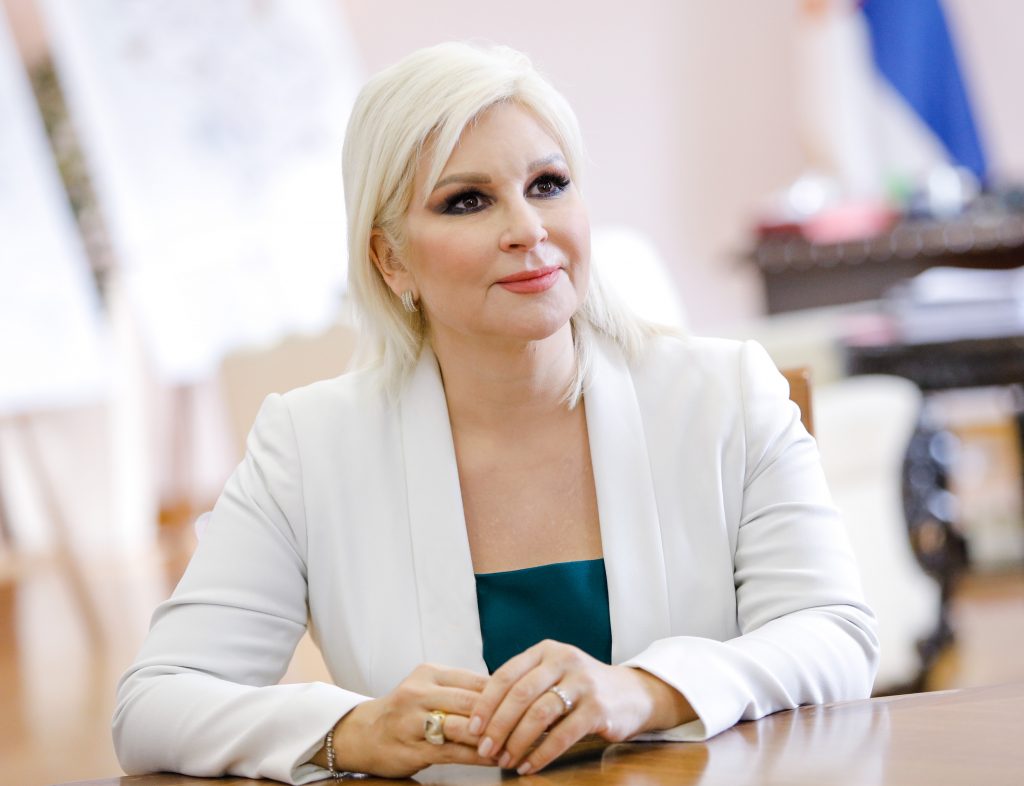American companies have invested more than 4 billion U.S. dollars in Serbia and employ about 20,000 people here.
We talked with the Deputy Prime Minister of the Republic of Serbia and the Minister of Mining and Energy, Zorana Mihajlović, who is also the Vice President of the Serbian-American Friendship Congress, about the development of relations between Serbia and the USA, as well as the work of the Ministry she helms. In the interview, she pointed out that the relations between the two countries have significantly improved both politically and economically, with important initiatives, devised by the Serbian-American Friendship Congress, launched to further solidify the ties between the two countries in terms of civil society, business people and associations, scientific and research institutions and the academic community.

This year, Serbia is celebrating 140 years of good bilateral diplomatic relations with America. How would you rate the overall relationship between the two countries today?
140 years of diplomatic relations between Serbia and the United States is an important jubilee and an opportunity to assess the current state of our relations, how much we have improved them in previous years and what we can do to elevate those relations to an even higher level. By the way, the first agreement that the two countries signed back in 1881 was the Agreement on Trade and Navigation, which makes Serbia one of the very few countries in the world with which the United States has such a long tradition of contractual regulation of economic cooperation.
In the last few years, we have achieved significant results and improved our cooperation both politically and economically. Among other things, the President of Serbia and the President of the United States met last year and signed an economic treaty in Washington. I believe that these relations can be even better, not only in the political sense but also in the economy and other areas such as gender equality, energy transition and the fight against climate change.
We expect that the new regulations and investments that will result from the new laws will increase the share of mining in GDP from the current 1.9% to between 3.5 and 4%.
Serbia wants to have the best possible relations with the United States, and I believe that a step in further improving our relations would be to conclude a strategic agreement that would facilitate cooperation in various segments. I believe that this would be important for our relations, but also the future of the entire region.
In 2001, we had one treaty with the U.S., in 2018, a memorandum on cooperation in infrastructure, and in 2021, an investment treaty. What else can be done to boost the relations between the two countries?
In previous years, infrastructure and traffic have demonstrated the potential for cooperation, which was not sufficiently utilized before. The Belgrade-New York flight was re-established in 2016 after almost a quarter of a century.
It turned out that the Memorandum of Understanding, about infrastructure, which Serbia and the United States signed in 2018, was an important step in strengthening cooperation in infrastructure, given the arrival of large American companies, such as Bechtel, which is currently constructing the Moravian Corridor, i.e. the Pojate-Preljina motorway segment. A memorial complex with a small airport was built in Pranjani, on the 76th anniversary of the heroic rescue of allied pilots who were captured behind enemy lines in World War II, during the Halyard mission. Last year, the Washington Agreement was signed, which creates many opportunities for investments and facilitates faster development of the region, through connections in transport and energy, and joint projects.
I believe that the next step that would greatly benefit the cooperation between Serbia and the United States would be to conclude a special agreement on strategic partnership with the United States, like Serbia, already has with the Russian Federation, the People’s Republic of China and some other countries.

How important is good cooperation for the stability of the region, in which Serbia plays a leading and very important and responsible role?
The region’s future is closely tied to the region’s country better connecting with each other and economic development, and I believe that this is the way to achieve political stability not only today but also for years and decades to come. Serbia occupies the central place in the region and in that sense, it is an unavoidable stakeholder when it comes to forming links in transport and energy. The U.S, support is also very important here, primarily in the shape of investments and projects aimed at regional integration. In that sense, the Washington Agreement is an important document and the projects it covers are important for the future of the region.
A step in further improving our relations would be to conclude a strategic agreement that would facilitate cooperation in various segments.
In terms of energy, Serbia’s goal is to connect with all its neighbours so that, besides transport, we can become a regional energy hub. We are connecting with our neighbours in the power distribution sector by building the Trans-Balkan Corridor, but we also have a strong presence in the gas sector, because the diversification of suppliers, in addition to diversification of routes, is key to energy safety not only in Serbia but also in the region. Serbia plans to use gas interconnections to connect with all neighbouring countries, and the first project in that direction is the construction of the Niš-Dimitrovgrad gas interconnection. We have already launched a tender to find a contractor and the plan is for this interconnection to become operational in 2023. This gas pipeline will create an opportunity for Serbia to get natural gas from the LNG terminals in Greece, as well as from the TAP and TANAP gas pipelines, which are part of the Southern Gas Corridor, which transports gas from the Caspian and Middle East region. In the future, after the completion of the East Mediterranean (EastMed) project, Serbia will have an opportunity to get gas from the coastal reserves from the Leviathan field, i.e. Cyprus and Israel.
What our country still needs to do to make the doing business environment as attractive as possible for investors, not only those who come from the US but everyone else too?
American companies have invested more than 4 billion dollars in Serbia, and today they employ more than 20,000 people here. This is the result of good political relations, but also of everything that Serbia has done in the previous period regarding fiscal consolidation and achieving macroeconomic stability, as well as getting higher credit rating and improving conditions for doing business. The best evidence of the progress we have made in securing a better environment for doing business is that we used to occupy 186th in the world on the World Bank’s Doing Business list in issuing building permits, and today, Serbia ranks 9th in the world. We hope that we are going to see even more American investments in Serbia, that is, that investors will recognize everything that the Government of Serbia has been doing to improve the business environment. In terms of energy, following the example of e-permits that we have introduced in construction, the new set of laws prescribes implementation of e-mining and e-energy services, which means that all related procedures will be shorter and more efficient, whether we are talking about mining, electricity or renewable energy sources. I believe that there is a lot of room for new investments in these areas too, both in mining and renewable energy sources.
The region’s future is closely tied to the region’s country better connecting with each other and economic development, and this is the way to achieve political stability.
You have said that the mining and energy sector can contribute much more to the national GDP. What development strategies will be implemented in this sector in 2021?
Serbia has drafted a new legal framework in mining and energy, which lays the foundation for a new energy policy based on green energy, higher energy efficiency, decarbonisation and moving towards climate-neutral development. The new law on renewable energy sources, which is in the process of adoption, will create a much more favourable regulatory framework that should attract companies that want to invest in RES. Among other things, the law introduces market premiums instead of the current feed-in tariffs, which will expose producers to market and competition rules, while reducing costs for individuals and businesses. Also, at the same time, investors have guaranteed stability and predictability of the legal framework. Our goal is for renewable energy sources to participate by up to 50% in energy consumption by 2050, which means that we need new investments in both wind farms and solar power plants, as well as geothermal energy and biomass.
New investments are necessary because of the energy security of Serbia in the decades ahead of us, but it is also important for increasing the share of energy in the national GDP, which could be significantly higher than it is today. Regarding mining, the goal of the new law is to create prerequisites for more efficient management of mineral resources, which will facilitate new investments, and for which we need to implement the environmental protection highest standards. We expect that the new regulations and investments that will result from the new laws will increase the share of mining in GDP from the current 1.9% to between 3.5 and 4%.

Last year, Serbia achieved excellent results in terms of GDP growth and was in the top five countries in Europe. What direction will the economy now take given that we experiencing a new pandemic wave?
Health and economic security are currently the biggest concern of all countries in the world, and they are inextricably linked to the pandemic. Serbia was among the first countries to ensure vaccination for its citizens who can choose between vaccines from several different manufacturers. We have also shown that the pandemic does not mean less solidarity. Following the initiative of the President of Serbia, we have donated vaccines to neighbouring countries so they can start vaccinating sooner rather than later.
For economic recovery, which will be neither easy nor simple, to be sustainable, we need to implement vaccination quickly and efficiently, and that is why we all must show responsibility to ourselves, our families and our country which made it possible for its citizens to get vaccinated. Success in vaccination and achieving collective immunity is important in order to preserve our economic stability and economic growth. The state has so far provided three packages of support for businesses, with a total value of 8 billion euro. We expect that some kind of support will still be needed in the next period because we are in an economic crisis affecting the whole world which why we all need to get vaccinated, so that life can return to the pre-pandemic state, but also so that we can save our economy.
Given that you are the Vice President of the Serbian-American Friendship Congress, do you think that the Serbian public awareness of our relations is changing for the better?
I believe that it mostly depends on us, that is, on how well we manage to connect and together accomplish concrete results that will convince citizens that Serbia is on the right track, to continue developing, and to have US support when it comes to political stability, economic development, and new investments. Political relations are the most important and visible part of that, but the initiatives launched by the Serbian-American Friendship Congress are also very important in terms of solidifying the ties between the two countries in terms of civil society, business people and business associations, scientific and research institutions, and the academic community. We must not forget that the relations between the two countries are not only the relations between the two governments but that what we have today, as the best tradition in Serbian-American relations, is largely due to the effort invested by scientists, athletes and business people who are responsible for raising Serbia’s recognizability in the U.S.A. and vice versa.